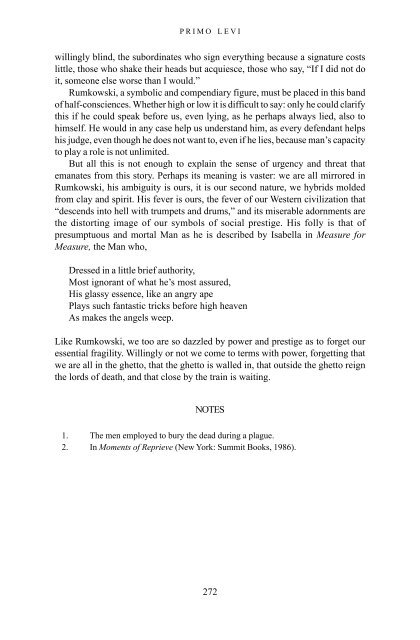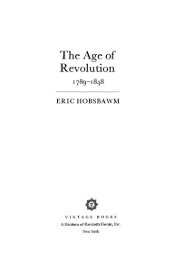- Page 2 and 3:
THE HOLOCAUST The Holocaust: Origin
- Page 4 and 5:
THE HOLOCAUST Origins, Implementati
- Page 6 and 7:
CONTENTS Series editor’s preface
- Page 8 and 9:
SERIES EDITOR’S PREFACE Rewriting
- Page 10 and 11:
ACKNOWLEDGEMENTS All articles and e
- Page 12 and 13:
INTRODUCTION Omer Bartov In the las
- Page 14 and 15:
INTRODUCTION consequently been faul
- Page 16 and 17:
INTRODUCTION Thus, for instance, Br
- Page 18 and 19:
INTRODUCTION The last three chapter
- Page 20 and 21:
INTRODUCTION them were associated.
- Page 22 and 23:
INTRODUCTION the phenomenon of what
- Page 24 and 25:
INTRODUCTION Reich: Bavaria 1933-19
- Page 26 and 27:
INTRODUCTION Taschenbuch Verlag, 19
- Page 28 and 29:
INTRODUCTION Monthly Review Press,
- Page 30:
Part I ORIGINS Antisemitism and sci
- Page 33 and 34:
RAUL HILBERG focused only on the pe
- Page 35 and 36:
RAUL HILBERG intermarriage, by proh
- Page 37 and 38:
RAUL HILBERG the attempt to drive t
- Page 39 and 40:
RAUL HILBERG 28
- Page 41 and 42:
RAUL HILBERG determinants with whic
- Page 43 and 44:
RAUL HILBERG misfortune in our coun
- Page 45 and 46:
RAUL HILBERG cholera germ—and, ge
- Page 47 and 48:
RAUL HILBERG peasants from the land
- Page 49 and 50:
RAUL HILBERG constituted authority.
- Page 51 and 52:
RAUL HILBERG of persecutions in the
- Page 53 and 54:
RAUL HILBERG NOTE 1. From 1789 Jews
- Page 55 and 56:
MICHAEL BURLEIGH and Nazi Germany i
- Page 57 and 58:
MICHAEL BURLEIGH psychiatrists. 5 P
- Page 59 and 60:
MICHAEL BURLEIGH ecclesiastical cha
- Page 61 and 62:
MICHAEL BURLEIGH pupils the task of
- Page 63 and 64:
MICHAEL BURLEIGH child’s death in
- Page 65 and 66:
MICHAEL BURLEIGH grand places (the
- Page 67 and 68:
MICHAEL BURLEIGH that he used the e
- Page 69 and 70:
MICHAEL BURLEIGH sia” in the Thir
- Page 71 and 72:
MICHAEL BURLEIGH 28. Staatsarchiv M
- Page 73 and 74:
MICHAEL BURLEIGH ‘Reformpsychiatr
- Page 75 and 76:
HENRY FRIEDLANDER international pri
- Page 77 and 78:
HENRY FRIEDLANDER assimilated. The
- Page 79 and 80:
HENRY FRIEDLANDER the conservation
- Page 81 and 82:
HENRY FRIEDLANDER RMdI, but the SS
- Page 83 and 84:
HENRY FRIEDLANDER “Zigeunerforsch
- Page 85 and 86:
HENRY FRIEDLANDER the middle 1980s.
- Page 87 and 88:
HENRY FRIEDLANDER il Lager della Ri
- Page 90 and 91:
4 THE EXTERMINATION OF THE EUROPEAN
- Page 92 and 93:
EXTERMINATION OF JEWS IN HISTORIOGR
- Page 94 and 95:
EXTERMINATION OF JEWS IN HISTORIOGR
- Page 96 and 97:
EXTERMINATION OF JEWS IN HISTORIOGR
- Page 98 and 99:
EXTERMINATION OF JEWS IN HISTORIOGR
- Page 100 and 101:
EXTERMINATION OF JEWS IN HISTORIOGR
- Page 102 and 103:
EXTERMINATION OF JEWS IN HISTORIOGR
- Page 104 and 105:
PLANNING INTELLIGENTSIA AND “FINA
- Page 106 and 107:
PLANNING INTELLIGENTSIA AND “FINA
- Page 108 and 109:
PLANNING INTELLIGENTSIA AND “FINA
- Page 110 and 111:
PLANNING INTELLIGENTSIA AND “FINA
- Page 112 and 113:
PLANNING INTELLIGENTSIA AND “FINA
- Page 114 and 115:
PLANNING INTELLIGENTSIA AND “FINA
- Page 116 and 117:
PLANNING INTELLIGENTSIA AND “FINA
- Page 118 and 119:
HITLER’S DECISION TO EXTERMINATE
- Page 120 and 121:
HITLER’S DECISION TO EXTERMINATE
- Page 122 and 123:
HITLER’S DECISION TO EXTERMINATE
- Page 124 and 125:
HITLER’S DECISION TO EXTERMINATE
- Page 126 and 127:
HITLER’S DECISION TO EXTERMINATE
- Page 128 and 129:
HITLER’S DECISION TO EXTERMINATE
- Page 130 and 131:
HITLER’S DECISION TO EXTERMINATE
- Page 132 and 133:
HITLER’S DECISION TO EXTERMINATE
- Page 134 and 135:
HITLER’S DECISION TO EXTERMINATE
- Page 136 and 137:
HITLER’S DECISION TO EXTERMINATE
- Page 138 and 139:
HITLER’S DECISION TO EXTERMINATE
- Page 140 and 141:
HITLER’S DECISION TO EXTERMINATE
- Page 142 and 143:
HITLER’S DECISION TO EXTERMINATE
- Page 144 and 145:
HITLER’S DECISION TO EXTERMINATE
- Page 146 and 147:
HITLER’S DECISION TO EXTERMINATE
- Page 148 and 149:
HITLER’S DECISION TO EXTERMINATE
- Page 150 and 151:
HITLER’S DECISION TO EXTERMINATE
- Page 152 and 153:
HITLER’S DECISION TO EXTERMINATE
- Page 154 and 155:
HITLER’S DECISION TO EXTERMINATE
- Page 156 and 157:
HITLER’S DECISION TO EXTERMINATE
- Page 158 and 159:
HITLER’S DECISION TO EXTERMINATE
- Page 160 and 161:
HITLER’S DECISION TO EXTERMINATE
- Page 162 and 163:
HITLER’S DECISION TO EXTERMINATE
- Page 164 and 165:
HITLER’S DECISION TO EXTERMINATE
- Page 166 and 167:
HITLER’S DECISION TO EXTERMINATE
- Page 168 and 169:
HITLER’S DECISION TO EXTERMINATE
- Page 170 and 171:
HITLER’S DECISION TO EXTERMINATE
- Page 172 and 173:
HITLER’S DECISION TO EXTERMINATE
- Page 174 and 175:
GERMAN SOLDIERS AND THE HOLOCAUST h
- Page 176 and 177:
GERMAN SOLDIERS AND THE HOLOCAUST d
- Page 178 and 179:
GERMAN SOLDIERS AND THE HOLOCAUST w
- Page 180 and 181:
GERMAN SOLDIERS AND THE HOLOCAUST S
- Page 182 and 183:
GERMAN SOLDIERS AND THE HOLOCAUST w
- Page 184 and 185:
GERMAN SOLDIERS AND THE HOLOCAUST a
- Page 186 and 187:
GERMAN SOLDIERS AND THE HOLOCAUST o
- Page 188 and 189:
GERMAN SOLDIERS AND THE HOLOCAUST G
- Page 190 and 191:
GERMAN SOLDIERS AND THE HOLOCAUST Y
- Page 192 and 193:
GERMAN SOLDIERS AND THE HOLOCAUST S
- Page 194 and 195:
GERMAN SOLDIERS AND THE HOLOCAUST F
- Page 196 and 197:
8 “ONCE AGAIN I’VE GOT TO PLAY
- Page 198 and 199:
WAR DIARY OF BLUTORDENSTRÄGER FELI
- Page 200 and 201:
WAR DIARY OF BLUTORDENSTRÄGER FELI
- Page 202 and 203:
WAR DIARY OF BLUTORDENSTRÄGER FELI
- Page 204 and 205:
WAR DIARY OF BLUTORDENSTRÄGER FELI
- Page 206 and 207:
WAR DIARY OF BLUTORDENSTRÄGER FELI
- Page 208 and 209:
WAR DIARY OF BLUTORDENSTRÄGER FELI
- Page 210 and 211:
WAR DIARY OF BLUTORDENSTRÄGER FELI
- Page 212 and 213:
WAR DIARY OF BLUTORDENSTRÄGER FELI
- Page 214 and 215:
WAR DIARY OF BLUTORDENSTRÄGER FELI
- Page 216 and 217:
PLACES FAR AWAY, PLACES VERY NEAR s
- Page 218 and 219:
PLACES FAR AWAY, PLACES VERY NEAR p
- Page 220 and 221:
PLACES FAR AWAY, PLACES VERY NEAR s
- Page 222 and 223:
PLACES FAR AWAY, PLACES VERY NEAR m
- Page 224 and 225:
PLACES FAR AWAY, PLACES VERY NEAR T
- Page 226 and 227:
PLACES FAR AWAY, PLACES VERY NEAR m
- Page 228 and 229:
PLACES FAR AWAY, PLACES VERY NEAR O
- Page 230 and 231:
10 UNDER A CRUEL STAR A life in Pra
- Page 232 and 233: UNDER A CRUEL STAR Three forces car
- Page 234 and 235: UNDER A CRUEL STAR at an even pace,
- Page 236 and 237: UNDER A CRUEL STAR It seems beyond
- Page 238 and 239: UNDER A CRUEL STAR and listened and
- Page 240 and 241: UNDER A CRUEL STAR had thought of n
- Page 242: UNDER A CRUEL STAR as open as the p
- Page 246 and 247: 11 REDEFINING HEROIC BEHAVIOR The i
- Page 248 and 249: REDEFINING HEROIC BEHAVIOR “The d
- Page 250 and 251: REDEFINING HEROIC BEHAVIOR reached
- Page 252 and 253: REDEFINING HEROIC BEHAVIOR be pract
- Page 254 and 255: REDEFINING HEROIC BEHAVIOR out the
- Page 256 and 257: REDEFINING HEROIC BEHAVIOR restore
- Page 258 and 259: REDEFINING HEROIC BEHAVIOR twice in
- Page 260 and 261: REDEFINING HEROIC BEHAVIOR have not
- Page 262 and 263: 12 THE GRAY ZONE Primo Levi In this
- Page 264 and 265: THE GRAY ZONE Have we—we who have
- Page 266 and 267: THE GRAY ZONE of primitive peoples:
- Page 268 and 269: THE GRAY ZONE not enough to relegat
- Page 270 and 271: THE GRAY ZONE commit the worst atro
- Page 272 and 273: THE GRAY ZONE many improbable event
- Page 274 and 275: THE GRAY ZONE sense, but something
- Page 276 and 277: THE GRAY ZONE Perhaps it is necessa
- Page 278 and 279: THE GRAY ZONE of “the death of th
- Page 280 and 281: THE GRAY ZONE daily by epidemics, m
- Page 284 and 285: 13 REMEMBERING IN VAIN The Klaus Ba
- Page 286 and 287: REMEMBERING IN VAIN White prisoners
- Page 288 and 289: REMEMBERING IN VAIN countries are g
- Page 290 and 291: REMEMBERING IN VAIN this realizatio
- Page 292 and 293: REMEMBERING IN VAIN might. But this
- Page 294 and 295: REMEMBERING IN VAIN human actions a
- Page 296 and 297: REMEMBERING IN VAIN which minoritie
- Page 298 and 299: REMEMBERING IN VAIN longer a place
- Page 300 and 301: REMEMBERING IN VAIN l’histoire. 6
- Page 302 and 303: REMEMBERING IN VAIN June 18, 1988).
- Page 304 and 305: INDEX Breitman, R. 65 brickyard 225
- Page 306 and 307: INDEX Krieg der deutschen Wehrmacht
- Page 308 and 309: INDEX 134, 222-4, 227, 252, 267-70
- Page 310 and 311: INDEX Rome ghetto 27 Rose, P. 83 Ro



